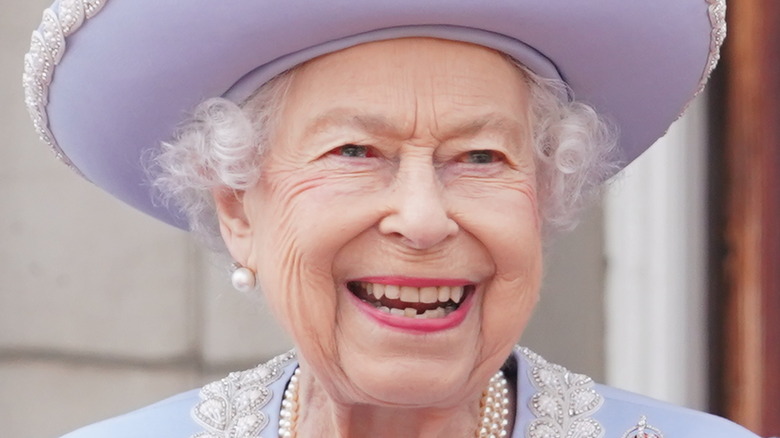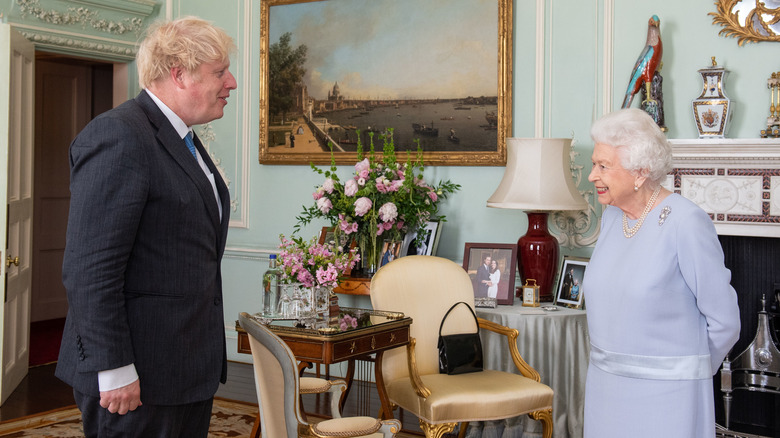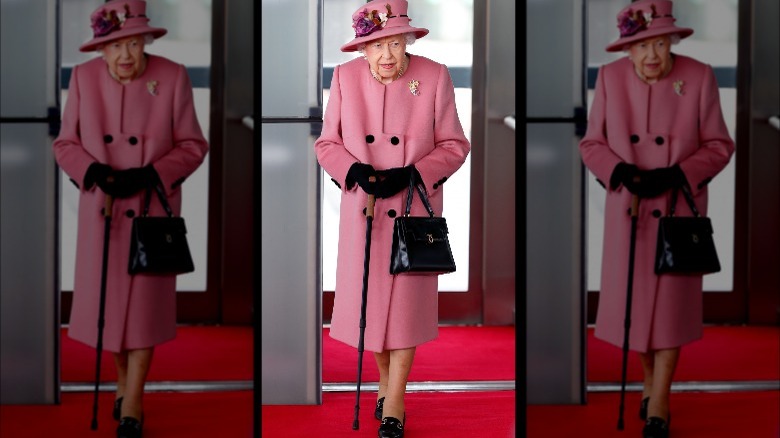Why The Queen's Unprecedented Plans For Appointing The Next PM Have Royal Fans Worried
Now that she's 96, Buckingham Palace has frequently used the words "episodic mobility problems" (via NBC News) to describe Queen Elizabeth's ongoing health difficulties. The ongoing challenge of being a nonagenarian in a demanding job has resulted in Elizabeth having to pull out of key events, like the May 2022 opening of Parliament. In June, the queen scaled back her presence at her Platinum Jubilee celebrations, skipping the Service of Thanksgiving after the previous day's Trooping of the Color caused her "some discomfort," according to a Buckingham Palace spokesperson, per People.
Since July 21, the queen has been at Balmoral in Scotland on her annual vacation. Her unusually quiet stay has been prompting new concerns about her well-being. While the queen hasn't been seen since she arrived, per Daily Mail, Prince Charles has been observed making frequent treks from his residence at Birkhall to see his mother, a move seen as unusual by Rob Jobson, Sunrise royal editor. Commenting on the queen's health, Jobson said, per 7 News, "It does seem that there's been deterioration or an issue with her mobility – it's still not 100 percent clear."
Royal fans continue to search for clues about the queen's health based on her actions. So when Buckingham Palace confirmed an unusual adaptation for the new prime minister's appointment, anxieties increased again.
Queen Elizabeth will stay in Scotland to appoint the Prime Minister
Buckingham Palace confirmed that Queen Elizabeth will meet Prime Minister Boris Johnson and appoint the incoming prime minister in Scotland on September 6, 2022, per CNN. The queen will not make the 1,000-mile round trip to appoint the new prime minister at Buckingham Palace or Windsor Castle.
Rebecca English, Daily Mail's royal editor, tweeted, "The decision has been taken now in order to provide certainty for the PM's diary. If Her Majesty were to be experiencing an 'episodic mobility issue' next week and the plan had been to travel to London/Windsor, alternative arrangements would have to be made at the last minute."
"There is no constitutional reason why the new PM should not be appointed in Balmoral," constitutional expert Professor Vernon Bogdanor told the BBC. "Indeed, some might think it pointless for the Queen at her age to travel to London for a purely formal ceremony."
However, this change is another reminder of the uncertainty surrounding the queen's health. "Makes me a bit anxious," tweeted a royal fan. "We all know the Queen is very elderly but she has always just been there. Hope she is comfortable and happy."
Appointing a new prime minister is part of Elizabeth's responsibilities as head of state, and BBC royal correspondent Sean Coughlan sees her decision optimistically, saying it "shows the tenacious determination of the 96-year-old monarch to keep carrying out her constitutional duties as head of state, wherever she might be."
Queen Elizabeth continues to modify her role to fit the realities of aging
Asking the new prime minister to travel for the "kissing of the hands" ceremony is something Queen Elizabeth has never done before. However, it is not without historical precedent. The most unusual appointment of a prime minister occurred in 1908 when King Edward VII appointed Herbert Asquith at a French hotel (via The Times). Also, prime ministers were regular visitors to Balmoral during Queen Victoria's reign, per The Telegraph.
Rebecca English, the Daily Mail's royal editor, announced an additional modification involving the new prime minister. "In another sign of the changing method of monarchy we are becoming used to, there is likely to be a privy council meeting the day after the Queen meets the new PM, which will be virtual," she tweeted. The queen has relied on virtual meetings with the Privy Council in the past due to pandemic restrictions (via The Telegraph).
While royal fans continue to watch and worry about Elizabeth's health problems, Michal Boyd, an associate professor at Auckland University and nurse practitioner, highlighted some of the day-today aspects of frailty—another word for the monarch's mobility concerns. "The thing with older people is, it's not unusual to have periods of frailty," Boyd told New Zealand's Stuff. "Part of that is exhaustion, loss of overall strength and decreased walking speed – usually that's progressive. But sometimes it can just be how they're feeling."


